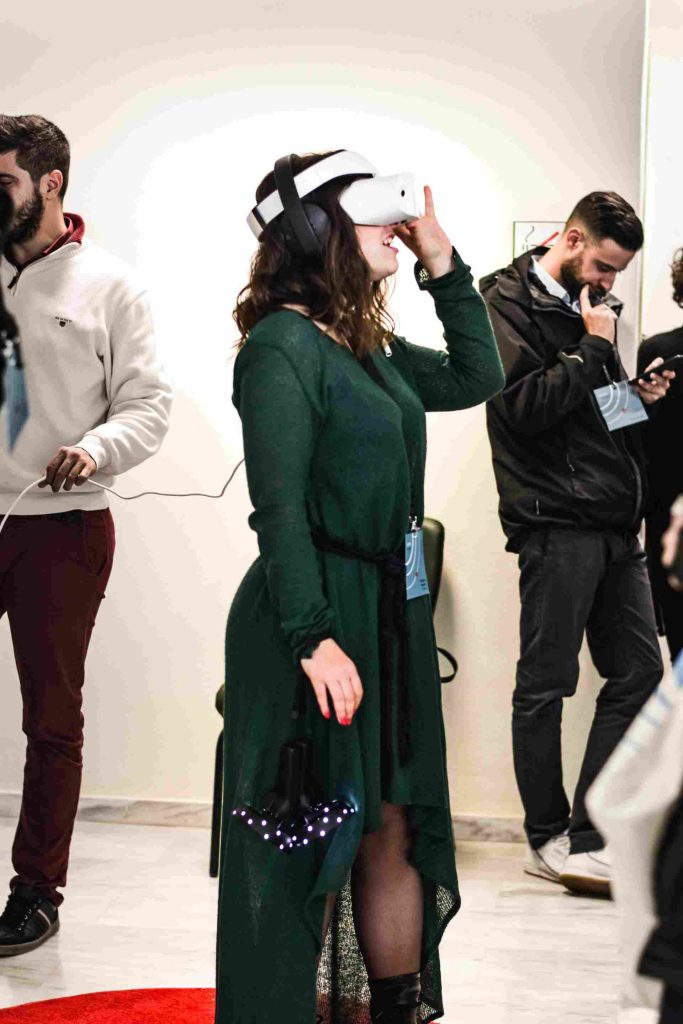An audiobook is a recorded version of a book that is played back, usually through headphones or speakers, allowing the listener to hear the book as if it were being read to them.
Virtual reality (VR) is a computer-generated simulation of a three-dimensional environment that can be interacted with in a seemingly real or physical way.
The combination of audiobooks and VR technology offers a new way of experiencing literature, where the listener can not only hear the book but also be transported into the world of the story. This creates a multisensory experience, where the listener can visualize the characters, settings, and events of the story, as well as hear them. This offers a more immersive experience compared to traditional audiobooks and opens up new possibilities for storytelling.
This article aims to explore the concept of audiobooks in virtual reality and its potential benefits and challenges, as well as the future implications of this technology on the world of literature and publishing.

The History of Audiobooks and Virtual Reality
Audiobooks have a long history dating back to the early 20th century when books were recorded on vinyl records. The advent of tape cassette players in the 1970s made audiobooks more accessible, as they became more portable and easier to listen to. The introduction of digital technology has made audiobooks even more widespread with the rise of online streaming services and digital downloads.
The concept of virtual reality can be traced back to the 1930s when researchers and scientists explored the idea of creating a simulated environment. The first VR headset was developed in the 1960s, but it wasn’t until the 1990s that VR technology became more mainstream with the release of video game systems and VR arcades. The recent advancements in technology have led to the development of high-end VR systems, such as the Oculus Rift and the HTC Vive, making VR more accessible to the general public.
The evolution of both audiobooks and virtual reality has been parallel and intertwined, with both technologies adapting to each other and new advancements in technology. For example, the popularity of audiobooks has led to an increase in the production of audio-based VR experiences, and VR technology has also allowed for new ways of creating and delivering audiobooks. The combination of audiobooks and VR technology represents the next step in the evolution of both technologies and offers a new way of experiencing literature.
Advantages of Audiobooks in Virtual Reality
The combination of audiobooks and VR technology creates an immersive experience where the listener is transported into the world of the story.
You can visualize the characters, settings, and events as they are being described, allowing you to experience the story on a deeper level.
This immersion can lead to a more engaging and memorable experience, making it easier to follow the story and understand its meaning.
The VR environment can help to reduce distractions, allowing the listener to focus more on the audiobook. This can lead to improved retention of the story and a better understanding of its themes and characters. You can select good audiobooks based on this selection, ensuring that the experience is tailored to your preferences and interests.
The VR environment can offer new possibilities for storytelling, allowing the author to create more vivid and engaging experiences for the listener. The use of VR technology can also enhance the emotional impact of the story, creating a more powerful connection with the characters and events. This can lead to a more engaging and memorable experience, making it easier to connect with the story on a deeper level.
The combination of audiobooks and VR technology offers a multisensory experience where the listener can hear and visualize the story at the same time. This can create a more vivid and engaging experience, allowing the listener to immerse themselves fully in the world of the story. The use of VR technology can also enhance the emotional impact of the story, creating a more powerful connection with the characters and events.
Potential Challenges of Audiobooks in Virtual Reality
High-end VR systems can be expensive, making it difficult for many people to access VR technology. The cost of producing audiobooks in VR can also be higher compared to traditional audiobooks, making it more difficult for publishers and authors to invest in this technology. This can limit the availability and selection of audiobooks in VR, making it difficult for listeners to find content that they are interested in.
The technical demands of VR technology can be challenging, requiring specialized hardware and software. This can make it difficult for publishers and authors to create and distribute audiobooks in VR, as they need to have the technical expertise to produce high-quality content. The complexity of VR systems can also lead to user frustration, making it difficult for some people to use and enjoy VR technology.
VR technology is still relatively new and not yet widely adopted by the general public.
This can make it difficult for publishers and authors to reach a large audience with their VR audiobooks. The uptake of VR technology will also depend on its ability to deliver compelling and engaging experiences, which can take time to develop and refine. User acceptance will also depend on the price and accessibility of VR systems, as well as the quality and selection of VR audiobooks available.
Future of Audiobooks in Virtual Reality
The use of VR technology is expected to grow in the coming years, as more people become familiar with and interested in this technology. The popularity of audiobooks is also expected to continue to grow, making VR a promising platform for experiencing literature in a new and immersive way. As VR technology becomes more advanced and accessible, more publishers and authors will likely invest in producing VR audiobooks. This could lead to a wider selection of VR audiobooks available to listeners, allowing them to explore and experience a wider range of stories and genres.
The use of VR technology in audiobooks has the potential to revolutionize the way we experience literature. It offers new opportunities for storytelling and can enhance the emotional impact of stories, creating a more powerful connection with the characters and events. This could lead to a new era of publishing and literature, where VR technology plays a central role in how we experience and engage with stories. It could also lead to new and innovative forms of storytelling as authors and publishers explore the possibilities of VR technology.
The future of VR technology and audiobooks is uncertain, but it is likely that both will continue to evolve and change in the coming years. Advancements in VR technology could lead to more advanced and immersive VR experiences, allowing listeners to fully immerse themselves in the world of the story. The use of VR technology in audiobooks could also become more widespread, leading to more diverse and accessible VR audiobooks available to listeners. As technology continues to evolve and improve, it will be exciting to see how it continues to shape the future of literature and publishing.
Conclusion
This article has explored the concept of audiobooks in VR, including the history and evolution of these technologies, the advantages and challenges, and the future of VR audiobooks.
The combination of audiobooks and VR technology offers a new and immersive way of experiencing literature, with the potential to revolutionize the way we engage with stories.
The future of VR audiobooks is uncertain, but it is an exciting time for this technology as it continues to evolve and change.
The combination of audiobooks and VR technology offers a new and exciting way of experiencing literature, with the potential to revolutionize the way we engage with stories.
While there are challenges to overcome, such as cost and technical barriers, the future of VR audiobooks is bright, with many exciting possibilities ahead. Whether you are a fan of audiobooks or VR technology or simply curious about how these technologies are changing the world of literature, now is a great time to explore this exciting and evolving field.
Disclosure: If we like a product or service, we might refer them to our readers via an affiliate link, which means we may receive a referral commission from the sale if you buy the product that we recommended, read more about that in our affiliate disclosure.
Read More: World News | Entertainment News | Celeb News
Tech Follows





